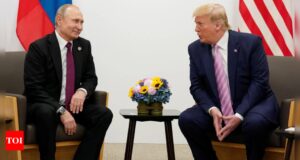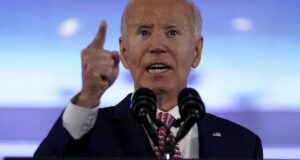The First Nations Voice has delivered its first message to the South Australian parliament: “We are determined to prove you wrong.”
MPs had to squeeze together to make room for all those who turned up to Wednesday’s special joint sitting to hear the Voice’s inaugural address.
Despite the federal voice referendum’s failure, and entrenched opposition by some in the chamber, all sat cheek by jowl to listen to Voice presiding member Leeroy Bilney. He was greeted with applause and his speech garnered table thumps of approval.
Bilney, a Marlinyu Ghoorlie, Wirangu, Kokatha, Mirning, Noongar and Barngala man, outlined the racist history of Australia, as well as its ongoing racism, the results of the intergenerational trauma of colonisation, and the challenges the Voice faces.
“There’s a lot of cynicism around the creation of the Voice, and there’s a heavy burden on us to prove ourselves … to prove ourselves to First Nations people who heard about the voice and thought ‘been there, done that’,” Bilney said.
“To prove ourselves to the critics who feel like this opportunity is giving First Nations people a special advantage that other South Australians don’t have, and to prove ourselves to those people who voted for us, who believe that this is a once in a lifetime opportunity to be seized.”
Despite these obstacles, Bilney said, SA’s legislation has brought the Voice into parliament, offering “a seat at the table where decisions are made”. Members of the Voice know what they have to do, he added, to “close the gap of knowledge … with evidence and truth telling”.
“Those of us who have been elected to the Voice realise just how incredible this moment is and how we have a great responsibility to our people, as well as those who put their faith in us by supporting the legislation that has helped us come into being,” he said.
“So do not be discouraged, for today is a great day to be a First Nations [person] in SA.”
Members of the Voice have already given feedback on several bills and met with cabinet and government agency chiefs since the legislation passed on a special Sunday sitting in March last year, months before the federal referendum.
In introductory remarks, the state’s attorney general, Kyam Maher, acknowledged SA’s “very proud tradition of listening to the voices and aspirations of Aboriginal and Torres Strait Islander South Australians”.
Maher highlighted the state’s Aboriginal land rights legislation; the Liberal government’s apology to the Stolen Generations in 1997; the 2015 introduction of Stolen Generations reparations; the 2016 beginning of treaty negotiations, and, now, the Voice.
Those who put their hands up to be part of the state Voice were doing a “remarkable thing” after the experience of the referendum, he said. “For far too long, governments of all persuasions, sometimes despite the best efforts and best of intentions, have failed to make the meaningful change that is required.
“Doing the same thing that we’ve done before is not an option.”
While the SA Voice was legislated without the level of vitriolic debate faced by the referendum, it has not always progressed smoothly.
The state Liberal party opposed the legislation and reportedly will not guarantee the Voice’s continued existence, while One Nation has introduced a bill to repeal the laws.
Four Voice members have resigned since the elections earlier this year, Maher confirmed to parliament on 14 November. He said that had happened for a “variety of reasons”, including personal and medical reasons.
More than six in 10 South Australians voted “no” in last year’s referendum.
Bilney said the Voice would work hard to overcome people’s doubts and make SA a better place for First Nations people, and all South Australians.
“We are determined to prove you wrong, because we believe in a better future, a future where we can each put our differences aside and work together constructively,” he said.




